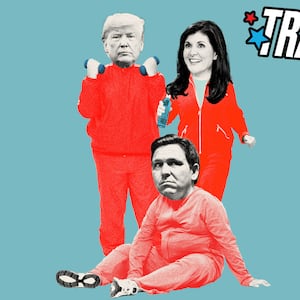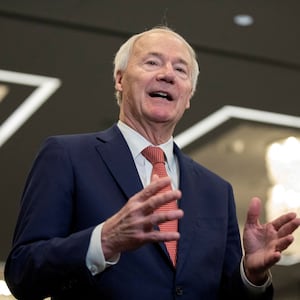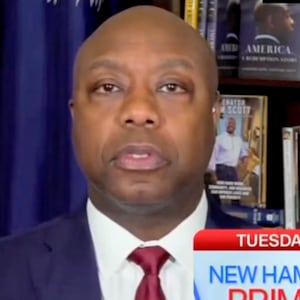DERRY, New Hampshire—Before introducing Nikki Haley inside a middle school library on Sunday morning, New Hampshire Gov. Chris Sununu hyped his pick for president as a street fighter.
“This is not child’s play,” Sununu told nearly 100 people waiting to hear Haley speak, two days before New Hampshire’s GOP primary election on Tuesday—a contest in which she has a shot to upset former President Donald Trump.
“This is where it happens,” Sununu continued. “This is where the contest really comes down to bare knuckles, on-the-ground politics, on-the-ground campaigning, spending the time with voters.”
But the person who emerged after Sununu on Sunday—and across the state in the run-up to Tuesday’s primary—sounded less like an upstart determined to shock the world and more like a frontrunner with everything to lose. Haley was cautious. Reserved. Content.
It’s a two-person race now, which Haley reminded the crowd later Sunday at Exeter High School to much applause. But with all the momentum, with Haley finally getting her wish for a one-on-one race, she’s still hardly attacking Trump. Far from bare knuckles, she’s barely adapted her stump speech.
There’s a distinct possibility that, come Tuesday, instead of closing the gap, Trump could widen it. And with expectations sky high for Haley—if not to beat Trump then at least to keep the contest close—if the situation breaks the other way and Trump wins handily, the 2024 Republican primary could surprisingly come to an abrupt close.
Polls show Haley has plenty of work to do in New Hampshire and elsewhere. But her strategy has increasingly looked like the political equivalent of running out the clock—even though she’s down two touchdowns.
Haley’s closing argument seems to be the same pitch she’s been making for months. Her major addition to her stump speech—a line about Trump’s age and mental fitness—comes across like more of a ding at President Joe Biden than an attack on Trump.
During his standard rant about security at the U.S. Capitol on Jan. 6, Trump has twice used Haley’s name when he meant to say former Speaker Nancy Pelosi. But instead of going for the jugular on that slip-up, it’s almost seemed like Haley is apologizing when she brings it up—both for Trump and for mentioning it.
“These things happen, because the more you age, it just does,” Haley said Sunday. “You have decline.”
When Haley repeated a consistent line on Americans not wanting two octogenarian general election candidates, a woman piped up from the crowd to sternly remind the candidate there were “lots of senior citizens in the room.”
“I’m not being disrespectful when I say that,” Haley replied.
After delivering her abbreviated stump speech in Derry on Sunday, Haley didn’t take questions from voters and sped off from the venue, en route to her next event. It was hardly the rough-and-tumble engagement with voters that Sununu had promised.
The scene encapsulated what has become a puzzlingly cautious finish to the New Hampshire campaign for the candidate who has bet it all on the state—where her performance could either demonstrate Trump’s weakness or end the strange 2024 primary in short order.
Haley has done more retail-centric stops in the closing days, such as appearing at diners and local country stores. During a quick diner stop on Friday in Hollis, Haley made news during an interaction at a booth despite her campaign’s best efforts to keep reporters at a distance from the candidate.
After a voter asked if she would serve as Trump’s running mate, Haley said being vice president was “off the table” and she didn’t “want to be anyone’s” VP. It was the first time she’d publicly expressed that position anywhere near that firmly—and it might have remained under wraps had a Politico reporter not been eavesdropping on the conversation.
The rapid-fire 15-second interactions with people eating their breakfast amounted to the most direct engagement Haley had with New Hampshire voters all week.
Although she used to shine during the question and answer portion of her events and bragged about taking more questions than other candidates, Haley has largely stopped doing so since her response to a voter question—what caused the Civil War?—sparked weeks of bad press.
Although Haley has cautiously escalated her attacks on Trump, her swings are far from direct punches. She keeps using the passive phrase “rightly or wrongly, chaos follows him” when explaining why she thinks it’s time for Republicans to move on.
The deference to Trump’s chaos is a problem for Haley in more ways than one, according to some close to the candidate.
“The big question is,” a source close to the Haley campaign told The Daily Beast, “is anyone listening to anything other than Trump’s drama? That seems to be what people are paying attention to.”
What makes the situation even more remarkable is that Haley’s best-case scenario for a path to the nomination has arguably fallen into place. In December, she picked up the endorsement of Sununu, a popular figure in the state. For weeks, several polls had shown her within striking distance of Trump, with a coalition of MAGA-allergic Republicans and independents potentially paving a path to an upset.
Then, in last week’s Iowa caucus, Haley finished strong enough behind Ron DeSantis to generate momentum—and saw her boasts of a “two-person race” come true on Sunday, when the Florida governor ended his campaign, leaving Trump and Haley the last candidates standing.
The problem for Haley is both the narrative and the data heading into the home stretch began trending in the opposite direction this week. Now, it seems that a big Trump win on Tuesday is just as likely as a healthy Haley showing.
“What we keep seeing is that, among Republicans, they’re happier with Trump, they’re more enthusiastic about Trump, and Haley’s numbers with people in her own party are kinda meh,” according to Dante Scala, a professor of political science at the University of New Hampshire and a longtime expert on the primary.
The warning signs were there for Haley even before Iowa dealt her a third place finish—many of which centered around the idea that expectations had possibly gotten dangerously high for the former South Carolina governor.
Sununu, normally inclined to touch up any sales pitch as much as possible, suddenly changed his tune when setting expectations for Haley.
The governor went from predicting in December that she would win in “a landslide” to telling ABC News last Thursday the campaign “always wanted to have a strong second” place finish in New Hampshire.
“That was a warning sign,” Scala said.
Around the time Chris Christie dropped out on Jan. 10, Haley was poised to keep building on her momentum and moving closer to pulling off an upset over Trump.
Two days after the Iowa caucus on Jan. 15, an American Research Group survey in New Hampshire showed her tied with Trump at 40 percent. Since then, however, she’s seen several new surveys showing her down by double digits in the days following the caucus.
“It is important to note that no candidate has won their party’s primary without winning the plurality of their party’s registered voters,” UNH pollster Andrew Smith said in his executive summary of the latest survey showing Haley trailing Trump by 11 points.
In that poll, Trump had 67 percent support among registered Republicans, taken on Jan. 19. Haley only had 23 percent support among those same GOP voters, compared to 58 percent support among independents, whom she’s banking on to push her over the top.
The major item on Haley’s wishlist came through on Sunday when DeSantis dropped out of the race. But that development was perhaps tempered by the fact that he promptly endorsed Trump. While the primary is now a two-person race, it turns out, the few DeSantis supporters in New Hampshire may offer little upside to her campaign.
“Of those remaining, I think they either don’t show, or those that do show vote for Trump and not for Haley,” Scala told The Daily Beast right after DeSantis dropped out on Sunday.
Still, those close to the Haley campaign are holding out hope for a wave of unexpectedly high turnout among undeclared voters to account for the gap in the polls. Their mantra might as well be the “normies” will save the day—the very term “normal people” has become a fixture of Haley’s messaging and a talking point for her intro speakers.
“I’m hoping that there’s a group of folks out there that have been waiting for a Nikki Haley-like candidate,” a source close to the campaign told The Daily Beast, requesting anonymity because they’re not authorized to speak to the press.
Still, the Haley supporter lamented how difficult it remains for the campaign to grab the attention of people who barely follow politics, “especially with Trump in the race.”
“She needs to come up with—the most difficult part of her campaign is dealing with Trump,” the Haley supporter said, adding it’s “impossible to replicate Trump’s personal drama,” which, the Republican conceded, may be too big an obstacle to overcome.
Aside from needing more support among registered Republicans and almost all of the remaining undecided voters to break her way, Scala said Haley’s biggest challenge is the gulf of interest in the race between her supporters and Trump’s, who keep registering as more enthusiastic and committed to voting in the polls.
“The Haley people, what they’re trying to do is fairly complicated, what Trump’s trying to do is fairly simple,” Scala said. Trump’s supporters are already locked in. Haley is depending on a coalition of Republicans and independents with a wide variety not just in political ideology, but how much they pay attention to politics in the first place.
“We all know New Hampshire primaries can be volatile in the last weekend, and I think our collective bias is when we think of volatile, we think of the race closing,” Scala said. “But the thing is, I think the volatility could go both ways.”
That other way—a widening between Trump and Haley—is what’s played out this week instead.
With just one more day of campaigning left, there’s only so much more the Haley campaign can do to engage voters who could be inclined to show up and support her.
“You can see a path for Haley, and it’s a very complicated one,” Scala said, in an observation that could easily apply to the entire anti-Trump GOP field. “But you also have to ask which percentage of Haley’s plan accounts for a healthy dose of wishful thinking.”









